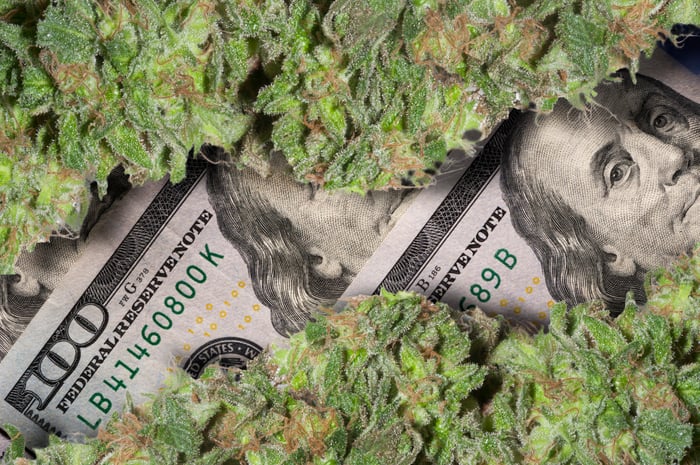It's been an incredible start to the new year for marijuana stocks. The Horizons Marijuana Life Sciences ETF, the first-ever pot ETF to trade in Canada, has risen by 54% year to date, through Feb. 21. Though this doesn't completely erase the downdraft pot stocks underwent between Oct. 1 and the end of last year, it's reaffirmed the cannabis industry as a force to be reckoned with.
Expect these cannabis trends to continue this year
This year, we're likely to witness a number of industry trends as the cannabis business spreads its wings. For example, the emergence of alternative cannabis options should be big by this fall. Recently, Health Canada outlined its plans to approve new consumption options, such as edibles and nonalcoholic cannabis-infused beverages, by no later than the one-year anniversary of the legalization of recreational pot (Oct. 17). Not only do these alternative products have higher price points and better margins than traditional dried flower (and are thus eagerly anticipated by most growers), but they're also more likely to attract brand-new consumers who aren't wanting to smoke cannabis.

Image source: Getty Images.
Consolidation is another trend that investors should expect to see continue throughout the year. As with any industry that's expected to see sales grow by 38% worldwide in 2019, there's bound to be a rush of companies up and down the supply chain that want in. Unfortunately, as is often the case with up-and-coming industries, this rush to compete can sap margins. This should encourage consolidation at all levels of the industry in 2019 and beyond.
The push to uplist to reputable U.S. exchanges is also expected to continue in 2019. Following the uplisting of CannTrust today, and Village Farms International this past Thursday, there are now nine pot stocks on either the New York Stock Exchange (NYSE) or Nasdaq (NDAQ 0.47%). Being listed on these exchanges as opposed to the over-the-counter exchange means improved visibility, better liquidity, and genuine legitimacy.
However, this desire to uplist to the NYSE or Nasdaq could also spawn an unwanted pot stock trend in 2019: share consolidation.
This unwanted pot stock trend is about to become popular
Another phrase encapsulating what "share consolidation" means that you're probably more familiar with is "reverse split." The opposite of a traditional stock split, a reverse split shrinks the number of shares outstanding, but results in an increase in a company's share price.

Image source: Getty Images.
To be clear, this doesn't increase or decrease a company's market cap. Rather, the sole intention of a reverse split would be to increase a publicly traded stock's share price in order to make it more attractive to Wall Street investment firms, or to remain listed on the NYSE or Nasdaq, which have minimum share-price requirements. Given that a low share price is more often than not associated with a troubled company or untested business model, reverse splits are typically viewed as having a bad connotation.
The reason we're likely to see reverse stock splits take hold in 2019 is simple: There are a lot of respectable market-cap pot stocks that want the validation of being listed on a major exchange but may not have the minimum share price needed to make the move.
For instance, vertically integrated cannabis company Aleafia Health (ALEAF 10.22%) is in the process of acquiring Emblem (NASDAQOTH: EMMBF). Aleafia Health and Emblem both run medical clinics and are expected to produce a combined 138,000 kilograms in peak annual output (98,000 kilos from Aleafia, and 40,000 kilos from Emblem). That may be good enough to slot the combined company in as the sixth-largest grower in Canada by peak annual yield. But in spite of a $300 million market cap for Aleafia Health and $173 million market cap for Emblem, Aleafia's $1.91 share price may be an impediment to uplisting.
This past October, Aleafia Health did file the appropriate paperwork for listing on the Nasdaq. However, Aleafia's chairman Julian Fantino released a letter to shareholders this past December asking that they support a possible share consolidation, which may be needed to maintain the $1 minimum list price for the Nasdaq.
Check out the latest earnings call transcripts for companies we cover.

Image source: Nasdaq.
Another prime example is Auxly Cannabis Group (CBWTF -0.83%). Auxly was initially designed to be a royalty company within the marijuana space. It would raise capital from selling its own stock, then parse out this capital to its licensed partners so they could expand their growing capacity. In return, Auxly Cannabis would receive a percentage of annual crop yield at a below-market cost. It could then sell this product at market rates and pocket the difference as profit. In recent quarters, Auxly has also moved into full grow-farm ownership, retail sales, and value-added services within the cannabis space. All told, Auxly may have its hands on 170,000 kilograms of marijuana each year, at its peak.
Auxly Cannabis also has a respectable market cap of $328 million, which would appear conducive for an uplisting. The problem is that this market cap growth has come at the expense of its share issuances. As of this past Thursday, Feb. 21, Auxly had a share price of just $0.55. In order to uplist to the Nasdaq, Auxly would probably need to execute a 1-for-5 or 1-for-10 reverse stock split to safely remain above the exchange's minimum share price.
By no means are Aleafia Health and Auxly Cannabis Group the only examples of possible reverse-split candidates among marijuana stocks. But it's pretty evident that, based on the rampant share-based dilution that has plagued this space, the likelihood of reverse splits being needed for uplisting -- or at least the very least to attract Wall Street coverage and/or investment -- is growing by the day.





